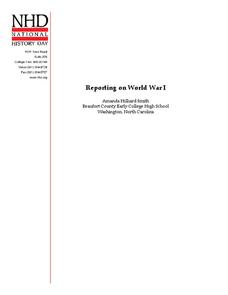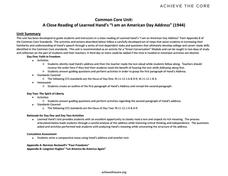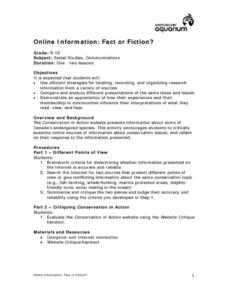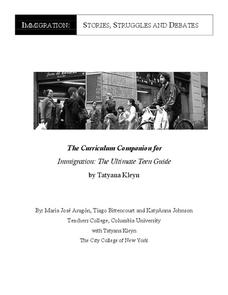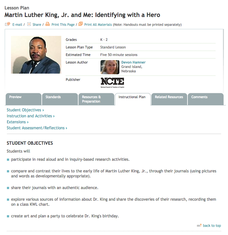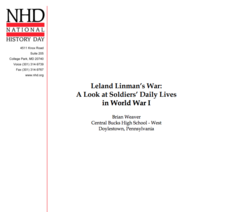Ford's Theatre
How Perspective Shapes Understanding of History
The Boston Massacre may be an iconic event in American history, but perhaps the British soldiers had another point of view. Using primary sources, including reports from Boston newspapers and secondary sources from the British...
Maryland Department of Education
Our Children Can Soar
Amazing efforts of African American leaders are celebrated in a lesson plan on civil participation. The engaging resource focuses on primary and secondary sources to analyze the impact of African American leaders such as Ella Fitzgerald....
Curated OER
Creating a North Carolina Gallery
Eighth graders, in teams, create a new North Carolina Gallery at the North Carolina Museum of Art. They explore the concept of citizenship by creating criteria for an artist's inclusion in the gallery.
PBS
A Veterans Day Thank You Note
This Veterans Day inspire scholars to say thank you to a veteran. Here, learners discover key details about a specific war using an interactive timeline, and then write a thank you letter offering their gratitude to someone who risked...
Constitutional Rights Foundation
Naturalized Citizens and the Presidency
Article II, Section 1 of the U.S. Constitution takes center stage in a lesson that asks class members to assume the role of state senators, debate a resolution to amend the U. S. Constitution to permit naturalized citizens to run for...
Channel Islands Film
Sa Hi Pa Ca (Once Upon a Time): Lesson Plan 2
What tools do archaeologists and anthropologist use to learned about what life was like in the past. After watching West of The West's documentary Once Upon a Time that details how scientists use artifacts to establish a history of the...
National History Day
Reporting on World War I
Throughout history, newspapers have reported the events of the day as they unfolded. Using primary and secondary sources from World War I, scholars uncover how the American people learned of the events of the War to End All Wars. History...
National History Day
Challenging the Status Quo: Women in the World War I Military
Why are some so resistant to change? The status quo is often to blame for a lack of forward movement in society. Following the events of World War I, women in America suddenly had a voice—and were going to use it. Scholars use the second...
Curated OER
In Pursuit of the American Dream
Students compare and contrast assimilation and acculturation. They explain the idea of "The Melting Pot" as it relates to what it means to be American. They write an 8 page response paper on a selected author.
Curated OER
A Close Reading of Learned Hand's "I Am an American Day"
Judge Learned Hand's "Spirit of Liberty" speech delivered during the July, 1944 "I Am an American Day" celebration is the subject of a close reading activity that models for learners how to approach a dense, difficult text.
Channel Islands Film
Dark Water: Lesson Plan 3 - Grades 6-12
After watching the documentary Dark Water about a traditional Chumash ceremony and reading a Chumash origin story, viewers are asked to create a coat of arms and to craft an essay that details a family tradition or their own origin story.
Channel Islands Film
The Legendary King
After viewing two documentaries about the history of the Channel islands, individuals craft an essay in which they compare the lives of Juana Maria, the Lone Woman San Nicolar Island, to Lester Holt and his family featured in the...
University of California
Impact of the California Missions on Native Americans
While the Spanish claimed to bring civilization to California indigenous peoples, in reality, they also brought violence and forced assimilation to European values. Primary sources, such as the reports of Catholic priests and Europeans...
Curated OER
"Shooting An Elephant": George Orwell's Essay on His Life in Burma
High school readers examine George Orwell's essay "Shooting an Elephant" for examples of symbolism, metaphor, connotation, and irony. They analyze how these literary tools convey the writer's main point and contribute to the persuasive...
Curated OER
Leaders, Laborers, and Other Perspectives of World War II
How did the women in France feel about their country’s involvement in World War II? Class groups are assigned a country involved in WWII, and individuals within the group adopt the point of view of leaders, laborers, businessmen, women,...
Curated OER
Online Information: Fact or Fiction
Discuss ways to determine if the information middle and high schoolers gather online is accurate. Using the Internet, they cite two sources that show conflicting points of view on a subtopic of conservation. They summarize and analyze...
Curated OER
The Presidential Quotation Report
Famous quotations by American Presidents are the focus of this Six Trait writing activity, which could be used in a U.S. History class or in language arts. After reading the picture book Theodore by Frank Keating, have your 7th graders...
Curated OER
Immigration: Stories, Struggles and Debates
Considering including Tatyana Kleyn's Immigration: The Ultimate Teen Guide as part of your course? Check out this curriculum guide designed for use with her book. The activities help learners understand the complexity of the immigration...
Library of Congress
Determining Point of View: Paul Revere and the Boston Massacre
If you're teaching point of view, this is the lesson for you! First, decipher the writer's point of view from a primary resource, then compare and contrast the primary source with a secondary source to explore the Paul Revere's engraving...
ReadWriteThink
Martin Luther King, Jr. and Me: Identifying with a Hero
Here, young historians compare their early lives to that of Dr. Martin Luther King Jr.'s. They listen to a read aloud of a story by Dr. King's sister, and then write in the provided reflective journal template. Lastly, they share their...
Channel Islands Film
Island Rotation: Lesson Plan 1
How do scientists provide evidence to support the theories they put forth? What clues do they put together to create these theories? After watching West of the West's documentary Island Rotation class members engage in a series of...
Minnesota Literacy Council
Introduction to Historical Thinking
Christopher Columbus: hero or villain? Prepare class members for the debate with activities that asks them to think critically about how history is reported.
National History Day
Leland Linman’s War: A Look at Soldiers’ Daily Lives in World War I
Hunkering down in the trenches of World War I, Leland Linman decided to write a journal about his experiences. By reading Linman's entries in the fourth installment of an eight-part lesson series, scholars get a firsthand look at life in...
National History Day
Why Did the United States Enter World War I in 1917?
World War I was the first major conflict on a global scale. Using primary documents, learners determine why the United States chose to enter World War I when it did. After analytical writing and group research, the causes of America's...








